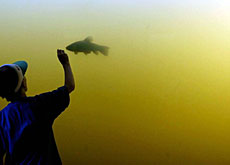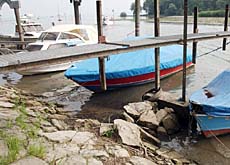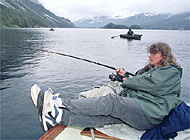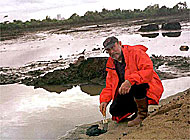Chemical “cocktail” decimates fish stocks

Chemical pollution, warmer temperatures and poor management of lakes and rivers are being blamed for the continuing decline in Switzerland’s fish stocks.
A new report, published on Friday, said urgent measures were needed to restore the country’s waterways to health.
During last year’s sweltering summer, television viewers were treated to images of thousands of dead fish being removed from the country’s rivers.
On the upper Rhine, between Stein and Schaffhausen, the country’s largest population of perch was almost totally destroyed by the above-average water temperatures. Fishery specialists said 16 tons of dead fish were recorded – some 40,000 perch.
Experts say that what became obvious over a few days last summer had been slowly building up for years.
According to the final report of the national fish research project, “Fischnetz”, stocks have been dwindling for some time, even though around 15 million fish are released into the wild every year.
The Swiss Environment Agency and the Federal Institute for Environmental Science and Technology oversaw the five-year project, which aimed to discover why stocks are continually dwindling.
Disease
“The main factors involved here are decreasing living space, chemicals in the environment, infectious disease and generally high water temperatures,” said project leader Patricia Holm.
The Basel University professor added that it was the cumulative effect of these factors that was proving too much for the country’s fish.
Some species, such as trout, have been struck by so-called proliferative kidney disease (PKD), which first appeared in the late 1970s. This illness has gradually spread to most of Switzerland’s rivers and lakes, and fish living in polluted waters are most susceptible.
Fish tend to succumb to the disease if the water temperature remains above 15 degrees Celsius for more than two weeks, something which has happened regularly in recent years.
High temperatures
Higher summer temperatures are partly to blame, but water temperatures have been rising in any case – by two per cent in the past 20 years – because of global warming and sewage treatment.
The measures proposed to deal with the problem have failed to make a difference largely because of cost and the lack of political will. One proposal to return riverbanks to their natural state, while technically simple, was deemed too expensive.
A national water protection law introduced 12 years ago has also been bogged down – some cantons have still to implement their own measures, while others have not yet produced a plan to clean up their watercourses.
“Fishermen are truly angry about this lack of implementation,” said Werner Widmer, president of the Swiss Fishermen’s Association. Their most obvious course of action now would be to force a nationwide vote to prompt the cantons to take action.
Removing chemicals from the environment may prove to be even more difficult.
Toxic brew
Despite the use of water treatment facilities and tough regulations for farmers, Switzerland’s fish are swimming in a toxic mix fed by industry, agriculture and households. Even at low concentrations, these chemicals can have serious effects on aquatic fauna.
More research will be required to identify these pollutants. According to Holm, much of the work has yet to be done. “There is a huge gap in our knowledge, and we won’t be able to overcome in a hurry,” she said.
Switzerland is not the only country having trouble finding what is lurking in its waterways. There is no precise information about the long-term effect on the environment and on people of most of the 100,000 chemicals available in the European Union.
The European Commission admits the issue needs to be dealt with quickly. A new law is being prepared at the moment which should lead to the testing of 30,000 potentially dangerous chemicals, most of which have been on the market for over 20 years.
swissinfo, Katrin Holenstein (translation: Scott Capper)
Switzerland has 70 species of fish, of which eight are considered extinct, five nearly extinct and 45 others threatened.
The main factors considered to be behind their decline are a shrinking habitat, chemical pollution and disease.
The “Fischnetz” project has recommended a series of measures to restore the fish population.
These include improving fish habitats, re-establishing natural riverbanks, replacing hard-to-eliminate substances found in mass-produced chemical compounds and reducing the use of pesticides and fertilisers by farmers.
Other measures suggested also include promoting biological farming, better implementation of water protection laws and upgrading water treatment facilities.

In compliance with the JTI standards
More: SWI swissinfo.ch certified by the Journalism Trust Initiative





You can find an overview of ongoing debates with our journalists here . Please join us!
If you want to start a conversation about a topic raised in this article or want to report factual errors, email us at english@swissinfo.ch.